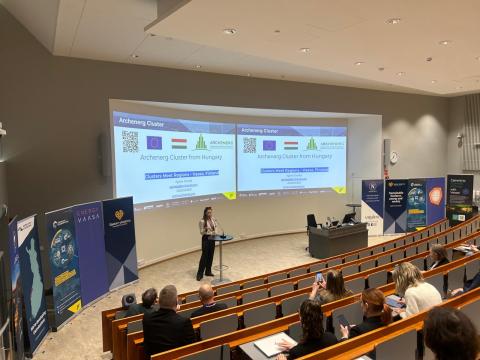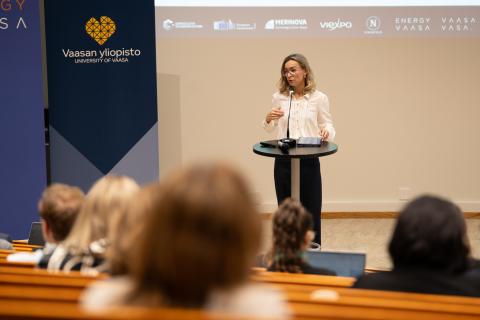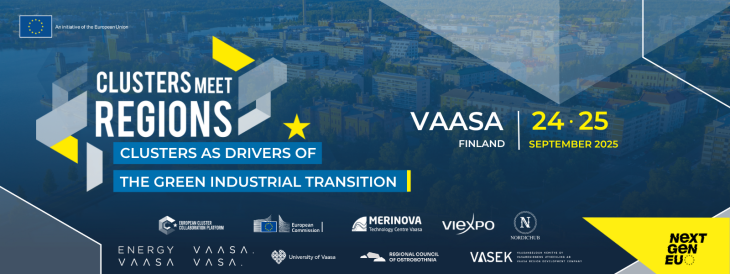Clusters Meet Regions in Vaasa: A Nordic Blueprint for Europe's Green Industrial Future
What happens when Europe's twin transition agenda meets a region already living it? The answer was on full display in Vaasa, Finland, during the latest edition of Clusters Meet Regions held on 24–25 September. Organised by the European Cluster Collaboration Platform (ECCP) on behalf of the European Commission, in partnership with EnergyVaasa, the University of Vaasa, the Regional Council of Ostrobothnia and Merinova, the event showcased how regional innovation ecosystems can accelerate clean industrial growth across Europe. The event opened with strong institutional support and a clear message: Vaasa is not only Finland's energy capital but a model for Europe. Joakim Strand, Finland’s Minister for European Affairs and Ownership Steering, highlighted how the Clusters Meet Regios initiative aligns with Finland’s national strategy and strengthens EU efforts around innovation, resilience and supply chain autonomy. He spotlighted on EnergyVaasa, emphasizing that this "strategic national asset" embodies the role of clusters as enablers of the green industrial transition.
Day One: From Regional Strengths to European Strategy
The event opened with strong institutional support and a clear message: Vaasa is not only Finland's energy capital but a model for Europe. Joakim Strand, Finland’s Minister for European Affairs and Ownership Steering, highlighted how the Clusters Meet Regions initiative aligns with Finland’s national strategy and strengthens EU efforts around innovation, resilience and supply chain autonomy. He spotlighted on EnergyVaasa, emphasizing that this "strategic national asset" embodies the role of clusters as enablers of the green industrial transition.
Jitka Vocaskova (DG GROW, European Commission) then introduced the Clean Industrial Deal, describing clusters as "drivers of change and multipliers of impact" with the power to translate EU decarbonisation goals into industrial competitiveness. Participants then heard from Mika Grundström, Vice-Rector (University of Vaasa), who echoed Vocaskova’s message, underlining the importance of linking education, innovation and energy policy under the university’s strategic pillars: sustainable business, energy and society.
Setting the local context, Mats Brandt, Mayor of Ostrobothnia, emphasised the region’s dual role in decarbonisation: lowering its own emissions while helping the world decarbonise through technology exports. Felix Ginzinger (Prognos AG) then presented the ECCP Input Paper, pointing to Western Finland's ability to drive the twin transition driven by its strong clusters which act as "strategic enablers, providing the intelligence to foster partnerships and drive cross-border initiatives.”
Policy experts Magdalena Cymerys (DG Research) and Antti Valle (Ministry of Economic Affairs) added perspectives on the EU’s startup and scaleup strategy, the European Innovation Agenda and Finland’s evolving industrial policy in response to new geopolitical realities. Sabina Storbacka (Merinova) then introduced the EnergyVaasa cluster strategy, which aims to make Vaasa a global benchmark in clean energy collaboration and export.
Collaboration in Action: Pitching and Parellel Workshops
The afternoon featured a lively pitching session, where clusters from across Europe shared project ideas and sought partners for EU collaboration. The pitches reflected the diversity and depth of innovation across the ECCP community:
Ilkka Aaltio (Green Net Finland): Showcased the FINESTJAPAN initiative, generating new exports from Finland and Estonia’s advanced green technology sectors to Japan.
Agnes Gonda (Archenerg Cluster): Introduced RENOINVEST, focusing on sustainable construction and renovation projects.
Kirsi Kinnunen, Energy Cluster North Savo: Highlighted a young but fast-growing cluster championing renewable energy and strong university–industry collaboration.
Oula Terttunen (Smart Innovation Norway): Presented the pioneering BeFlexibleEU project, utilisining behavioural science to enable flexible, user-driven energy systems.

Three parallel workshops followed:
Cluster Collaboration in Manufacturing explored advanced technologies such as robotics, AI and digital twins to enhance productivity. Participants co-created ideas and identified potential partnerships across borders.
Place-based Climate Action looked at how cities and clusters can lead local transitions through strategic partnerships. Hosted by the City of Vaasa, the session focused on regulatory needs and climate leadership.
Industry-University RDI Cooperation was hosted by the University of Vaasa and centred on building innovation-driven consortia. Participants co-developed best practices and real-world models for successful cooperation.

|

|
The evening concluded with informal networking at the University of Vaasa’s Fabriikki, an academic-led initiative that hosts events in a creative space featuring more than 150 arcade games. Typically used to connect students and researchers with local businesses, it fosters RDI partnerships and career opportunities in a relaxed, informal setting.
Day Two: From Dialogue to Direction
Day two began with a synthesis the outcomes of the previous day’s workshops, offering a chance to translate diverse experiences and professional insight into shared learning. Workshop leads and participants shared lists of good practice, how to build innovation-driven consortia and discussed potential project ideas which could boost productivity and innovation in the advanced manufacturing sector.
The programme continued with a deep dive into EU industrial policy and the Clean Industrial Deal. Jitka Vocaskova returned to introduce the Competitiveness Compass and outlined priorities for closing the innovation gap, scaling clean technologies and building resilient, diversified supply chains. She emphasised the role of clusters in driving regional decarbonisation and innovation, acting as bridges between industry, academia and policy. Drawing on the Euroclusters example, she highlighted how cross-border collaboration strengthens ecosystems, while calling for continuous dialogue to ensure EU policies reflect real-world conditions.

Davide Magagna (Joint Research Centre, European Commission) introduced Transformative Innovation Policies (TIPs) during the session on Transformative Innovation for Net Zero, calling for “adding an S to S3” to embed sustainability into smart specialisation. He described Ostrobothnia as “a strong region with significant growth, a strong energy cluster and a lot that can be done,” noting ongoing JRC partnerships as proof of its role as a frontrunner in place-based, climate-focused innovation.
In the final panel, Mats Brandt (Regional Mayor of Ostrobothnia), Mika Grundström (University of Vaasa), Kenneth Widell (Wärtsilä), Pia Karumaa (Danfoss Drives) and representatives from the European Commission highlighted how quadruple helix collaboration, strategic foresight and open, continuous dialogue can help clusters and regions co-create the conditions for clean, competitive and connected growth.
Site Visits: Innovation in Practice
In the afternoon, delegates visited:
Wärtsilä’s Sustainable Technology Hub is a cutting-edge facility at the forefront of clean marine and energy innovation. It develops advanced engine technologies that power one in three ships worldwide. A standout example is Wasaline’s Aurora Botnia ferry, linking Vaasa to Sweden, which embodies both the city’s role in pioneering clean-tech solutions and its outward-looking perspective.
Technobothnia Research Lab, an R&D centre supporting collaboration between academia and industry across 25 specialised laboratories. With local and international companies donating technology, students from three partnering universities can utilise the space to gain real world experience in key sectors, such as electronics, manufacturing and energy.
These visits gave participants a tangible sense of how Vaasa translates strategic vision into real-world industrial transformation.
What's next?
The momentum from Vaasa now carries into the upcoming Cluster Collaboration Lab (#C2Lab) and Cluster Summit Finland in Kuopio (28–30 October 2025), where participants will further develop the ideas and partnerships launched in Vaasa.
"Clusters matter. They contribute to policies, create innovations and play a big role in Europe’s competitiveness," summarised Sabina Storbacka, Programme Director, Merinova Technology Centre Oy.
🔗 Learn more and join upcoming ECCP events.




